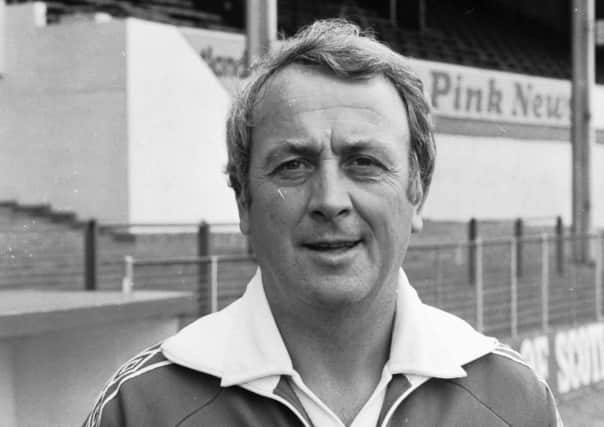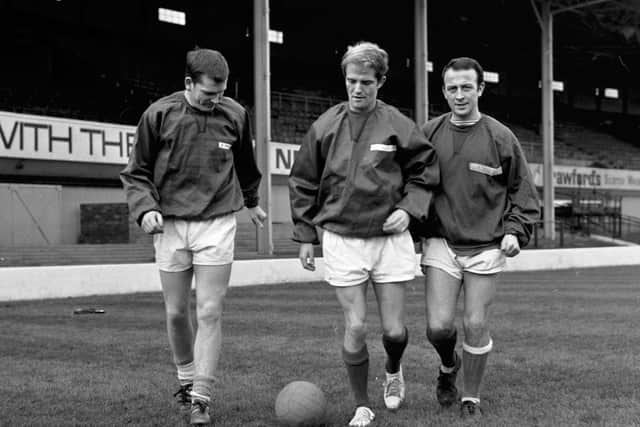Obituary: Pat Quinn, free-scoring football player, manager and coach


PAT Quinn, who has died after a nine-year battle against dementia, was one of the shining stars in the great “Ancell Babes,” Motherwell side of the late 1950s and early 1960s.
The great forward line of that team – Willie Hunter, Sammy Reid, Ian St John, Quinn and Andy Weir – seemed to score goals for fun. All except Reid were capped for Scotland – but he did go on to score perhaps the most -famous goal in Scottish club football, the one for Berwick Rangers which beat Rangers in the Scottish Cup in 1967.
Advertisement
Hide AdAdvertisement
Hide AdAn East End boy, Quinn’s ambition was to play for Celtic. However, they rejected him as “too wee”. His career began with Bridgeton Waverley juniors, marking his time with that famous club by being picked for Junior Scotland, against Ireland.


He had a couple of games as a trialist for Albion Rovers in 1955, but it was when later that same year he signed for Motherwell that his career really took off.
Motherwell had famously escaped relegation via league reconstruction. Veteran manager George Stevenson stood down to be replaced by Bobby Ancell and the new man decided to give youth its head.
Quinn was one of the first youngsters to be given his chance, making his debut in the floodlit friendly against Preston North End, which marked the inauguration of the Fir Park floodlights. He came off the bench to replace the injured Billy Reid, against a North End side which featured Tommy Docherty and Sir Tom Finney, and never looked back.
However, in common with most of the players of that era, he had to do National Service, in the Army. The British Army XI of that time was a formidable squad, packed with full or Under-23 internationalists from the four Home Countries, but, such was Pat’s talent, he was a regular choice during his two years of service.
He won the first of an eventual six Scottish League caps, scoring the final goal in a 4-1 win over the League of Ireland, in September, 1959. Normally, back then, selection for the League XI would be followed by Under-23 caps and eventually a full one. Quinn never did get an Under-23 cap, and he had to wait nearly two years, until April, 1961, for his first Scotland cap.
A good performance in helping the Scottish League beat the English League 3-2 in March 1961 set-up Quinn for his debut against the English at Wembley on 15 April, 1961. It should have been a red letter day for the 24-year-old. Instead, he was part of the Scotland team handed our worst-ever beating.
However, he kept his place for the next two internationals, the opening salvoes in the 1962 World Cup qualifying campaign, home and away against the Republic of Ireland. Both games were won before Quinn was left out, the selectors favouring Rangers’ veteran Ian McMillan for a disastrous trip to Bratislava and a 4-0 drubbing from Czechoslovakia.
Advertisement
Hide AdAdvertisement
Hide AdFor Quinn, there would be one further cap, in a 2-3 loss to Uruguay, at Hampden, in May, 1962.
Perhaps the highlight of Quinn’s Motherwell years was on 1 March, 1961, when he played a crucial role in a memorable win. They went to Ibrox to play Rangers in a Scottish Cup replay, gave their hosts a 2-1 half-time lead, then blew them away in the second half, leaving 90,000 fans stunned as the Steelmen won 5-2. Quinn’s masterly display that night played a big part in him being capped the following month.
But, like every other Scottish provincial side, Motherwell could not afford to keep hold of their best players. Quinn, after 250 games for Motherwell, signed for Blackpool for £34,000 in late 1962. However, he found life in England difficult, leaving team mates such as England captain Jimmy Armfield disappointed when he came back up the road, to Hibs, where he established himself as a key player in a very-good side, managed by Jock Stein, then Bob Shankly.
He played over 200 games for Hibs, cementing his place in the club’s pantheon of heroes with a hat-trick against Hearts in 1967, a great goal in their legendary win over Real Madrid in a 1964 friendly, and another goal in their equally-celebrated 5-0 win over Napoli in the Fairs Cup. Along the way, he had been the Easter Road club’s first official substitute in a competitive game, against Clyde.
His final game for Hibs was against Celtic in the 1969 League Cup Final after which he moved across the Forth, to become player-manager, later manager, at East Fife – where he is fondly remembered after he led them to promotion in 1971. Quinn, however, preferred coaching to the trials of managing. He had a successful spell in Iceland, before a long spell as Bertie Auld’s assistant at Partick Thistle – where he was for a time caretaker manager following Auld’s departure – back at Hibs, and with Hamilton Academical. His final coaching position was back at Motherwell with Jock Wallace, who wanted to take him with him when he went back for a second spell at Rangers; however, as Pat himself said: “with Rangers, at that time, that was never going to happen,” so, Alex Totten got the gig instead.
Pat Quinn really was happiest on the training field, working with players, rather than being involved in club “politics” as a manager. Former Scotland manager Craig Brown remembers Pat as being a highly-respected and well thought-of staff coach at the SFA’s coaching courses at Largs in the 1970s.
He had a wonderful range of passing, with the ability to chip in with crucial goals.
He was from the “small but gifted” school of Scottish inside forwards and a stand-out player at a time of plenty in the game here. He was also, in his younger days at Motherwell, very popular with his team mates, since he was just about the only player with a motor car – a Ford Zephyr, a legacy of the fact his father was a successful bookmaker.
Advertisement
Hide AdAdvertisement
Hide AdIan St John, perhaps summed him up best when, in his autobiography, The Saint described him as: “The quintessential Scottish inside forward – small, tough and creative. On his best days, it must have appeared as if the rest of us were operating on the end of his string.”
Football was his life and he lived the game to the full. Pat Quinn is survived by son Paul, daughter Brenda and grand-sons Ross and Grant.
Comments
Want to join the conversation? Please or to comment on this article.